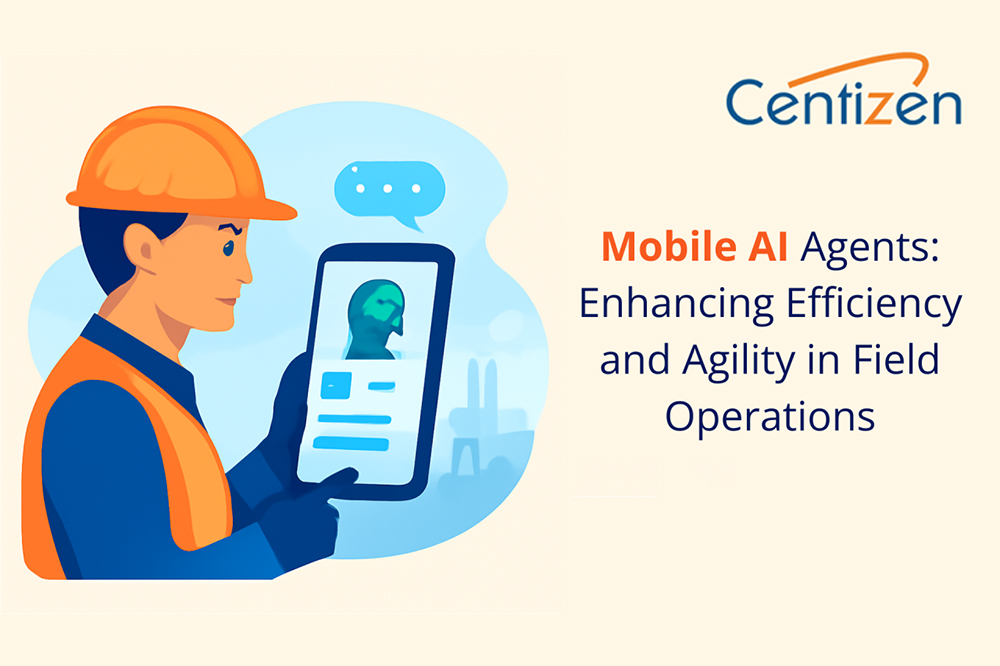Mobile AI Agents: Enhancing Efficiency and Agility in Field Operations

Introduction: Mobile AI agents in field operations
- Mobile AI agents are transforming industries like construction, healthcare, and manufacturing, where field operations play a critical role.
- Traditional mobile apps struggled to meet the demands of field workers due to poor performance, user experience, and low adoption rates.
- The mobile-first mindset now drives the development of mobile apps, focusing on fieldworker-specific needs.
- Agentic AI is pushing this evolution, offering proactive, real-time support, improving operational agility, and optimizing field operations.
How mobile AI agents enhance efficiency in field operations
- Proactive Support: AI agents anticipate fieldworkers’ needs and provide real-time guidance. The experience is personalized, with AI helping fieldworkers make informed decisions quickly, without constant reliance on headquarters.
- Dynamic User Experience: Instead of static forms and checklists, AI-driven apps provide personalized data visualizations and prompt interfaces. Mobile AI adapts to each worker’s situation, reducing search time and improving speed.
- Real-time Decision Making: With predictive assistance, mobile AI agents forecast necessary actions and offer on-the-spot solutions, reducing downtime and enhancing operational efficiency.
Key use cases for mobile AI agents in field operations
- Real-time guidance and task sequencing: AI agents help field workers by suggesting the best sequence of tasks based on available data. Example: A manufacturing technician receives recommendations on which task to prioritize for maximum efficiency.
- Context-aware assistance: AI agents use location, weather, and maintenance history to offer insights that improve field decision-making. Example: A construction worker is alerted to potential safety hazards based on real-time weather and site conditions.
- Proactive problem-solving: AI acts as a virtual assistant to guide workers through troubleshooting processes, improving problem resolution without delay. Example: A field engineer receives step-by-step guidance on repairing equipment using AI.
- Multilingual support: AI-powered apps provide real-time translation and language support, making them accessible to workers from diverse linguistic backgrounds.
AI-powered mobile apps: Enhancing fieldwork productivity
AI integration in mobile apps eliminates manual tasks and empowers field workers to focus on high-value activities.
Predictive and proactive support helps workers make better decisions on-site.
- Example: In healthcare, AI apps assist healthcare workers with patient insights, enhancing care and reducing errors.
- Example: In construction, AI helps with real-time project management, suggesting schedule adjustments based on field data.
Advanced capabilities with AI, wearables, and 5G
- Wearables and AR integration: AI, when paired with wearable devices (e.g., smart glasses), can provide augmented reality (AR) overlays, offering real-time equipment data and step-by-step guides.
- 5G networks: 5G connectivity enables real-time data processing for AI agents, crucial in industries like healthcare and construction where immediate information is critical.
- Improved technician capabilities: AI-driven apps help technicians access expert-level guidance through text, voice, or video tutorials, boosting productivity and safety. Field technicians can operate efficiently without being experts in every task.
Challenges to overcome: Risks and considerations
1.Outdated infrastructure:
- Many companies face barriers to implementing AI due to outdated systems.
- 92% of manufacturers reported that legacy systems hinder AI adoption.
- Solution: Upgrade infrastructure and invest in cybersecurity, scalability, and AI governance.
2. Data quality:
- Inaccurate or incomplete data can lead to unreliable outputs from AI agents.
- Organizations must ensure high-quality, structured data for effective AI integration.
3. Data security and privacy:
- Using sensitive data in AI applications poses security risks and privacy concerns, especially in sectors like healthcare and energy.
- Solution: Strengthen data governance, ensure compliance with regulations, and focus on secure AI practices.
Conclusion: The future of mobile AI in field operations
- Mobile AI agents will continue to revolutionize field operations by offering real-time, proactive support across industries like construction, healthcare, and manufacturing.
- By reducing administrative work, enhancing decision-making speed, and improving productivity, AI agents will drive greater operational efficiency.
- For successful adoption, businesses must ensure their infrastructure is AI-ready and that their data quality meets the standards required for effective AI support.
Our services:
- Staffing: Contract, contract-to-hire, direct hire, remote global hiring, SOW projects, and managed services.
- Remote hiring: Hire full-time IT professionals from our India-based talent network.
- Custom software development: Web/Mobile Development, UI/UX Design, QA & Automation, API Integration, DevOps, and Product Development.
Our products:
- ZenBasket: A customizable ecommerce platform.
- Zenyo payroll: Automated payroll processing for India.
- Zenyo workforce: Streamlined HR and productivity tools.
Services
Send Us Email
contact@centizen.com
Centizen
A Leading Staffing, Custom Software and SaaS Product Development company founded in 2003. We offer a wide range of scalable, innovative IT Staffing and Software Development Solutions.
Call Us
India: +91 63807-80156
USA & Canada: +1 (971) 420-1700
Send Us Email
contact@centizen.com
Centizen
A Leading Staffing, Custom Software and SaaS Product Development company founded in 2003. We offer a wide range of scalable, innovative IT Staffing and Software Development Solutions.
Call Us
India: +91 63807-80156
USA & Canada: +1 (971) 420-1700
Send Us Email
contact@centizen.com






